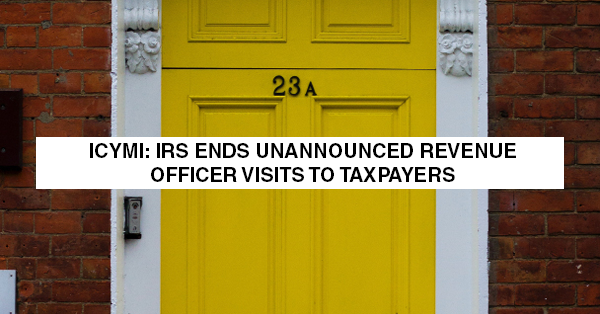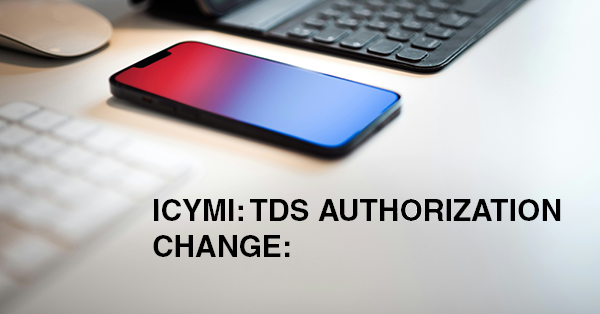ICYMI: IRS ENDS UNANNOUNCED REVENUE OFFICER VISITS TO TAXPAYERS

As part of a larger transformation effort, the Internal Revenue Service has announced a major policy change that will end most unannounced visits to taxpayers by agency revenue officers to reduce public confusion and enhance overall safety measures for taxpayers and employees.
The change reverses a decades-long practice by IRS revenue officers, the unarmed agency employees whose duties include visiting households and businesses to help taxpayers resolve their account balances by collecting unpaid taxes and unfiled tax returns. Effective immediately, unannounced visits will end except in a few unique circumstances and will be replaced with mailed letters to schedule meetings.
IRS Commissioner Danny Werfel announced the change as part of a larger effort to transform IRS operations following passage of the Inflation Reduction Act last year and the creation of the new IRS Strategic Operating Plan in April.
"We are taking a fresh look at how the IRS operates to better serve taxpayers and the nation, and making this change is a common-sense step," Werfel said. "Changing this long-standing procedure will increase confidence in our tax administration work and improve overall safety for taxpayers and IRS employees."
Werfel also noted that there have been increased security concerns in recent years on multiple fronts. The growth in scam artists bombarding taxpayers has increased confusion about home visits by IRS revenue officers. Sometimes scam artists appear at the door posing as IRS agents, creating confusion for not just the taxpayers living there but local law-enforcement.
For IRS revenue officers, these unannounced visits to homes and businesses presented risks. Revenue officers routinely faced hazards and uncertainty making unannounced visits to attempt to resolve delinquent tax matters.
"These visits created extra anxiety for taxpayers already wary of potential scam artists," Werfel said. "At the same time, the uncertainty around what IRS employees faced when visiting these homes created stress for them as well. This is the right thing to do and the right time to end it."
The change reflects the ongoing evolution of tax administration work taking place. Werfel noted that funding under the Inflation Reduction Act will add more staffing for compliance work. The IRS continues to focus on key areas, such as high-income taxpayers with tax issues, as efforts continue on transforming the IRS. Improved analytics will also help IRS compliance efforts focus on those with the most serious tax issues.
"We have the tools we need to successfully collect revenue without adding stress with unannounced visits," Werfel said. "The only losers with this change in policy are scammers posing as the IRS."




